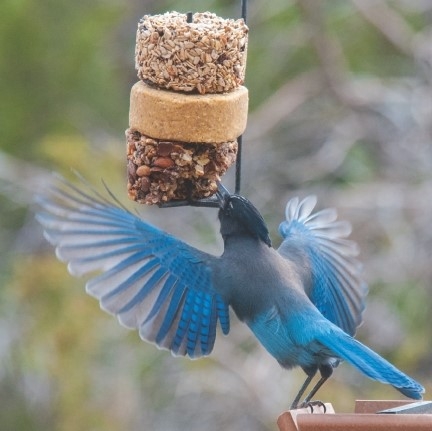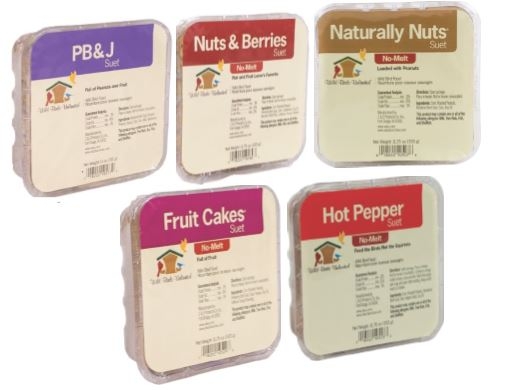About Suet and Dough (Summer Suet)
Suet: An Excellent Food All Year Long
Feeding suet and suet dough is helpful for birds year-round. It is fun and exciting to see the different kinds of birds that can be attracted by providing suet...ones that often don't come to seed. Wild Birds Unlimited's suet and suet dough is made from the highest quality beef kidney fat. Our suet is rendered to remove impurities that can cause spoilage.
Feed Suet Dough Year-round
Regular suet is generally used in cooler weather states, and in warmer weather suet "dough" is formulated with a higher melting point so it won't get "goopy" in warm weather. (Using "Summer" suet means you might get to watch young woodpeckers learn where dad or mom goes to get food!) We don't recommend using regular suet here in San Diego. Even in the Winter it can get too warm and "goopy" in most of the climates found within San Diego County. You may hear the term suet used in our store, but we are referring to suet dough.
The variety of suet flavors helps to attract a variety of birds. It is especially helpful to birds when their natural food source is hard to find (during winter months) or when the birds are nesting and raising their young. It is fun to watch birds bring their young to suet feeders in the summer months.
All of our suets are high in calories from fat, which is the most important component of suet. Protein is also important and ingredients like nuts provide protein. All of our suet is rendered and refined to remove impurities that cause spoilage. Birds' use of suet supplements their diet with beneficial nutrients for energy and protein for metabolic use; it doesn't replace their main food source. They eat a wide variety of foods year-round.
Shown here, left to right, top to bottom: top row: PB&J Suet; Nuts & Berries Suet Dough, Naturally Nuts Suet Dough; bottom row: Fruit Cakes Suet Dough and Hot Pepper Suet Dough (Hot Pepper flavor to deter rodents).

Why Suet Dough?
Suet is technically the hard fat around the kidneys and loins in beef and mutton, but in common usage, most beef fat is called suet and can safely be fed to birds. Are you surprised to hear that birds eat animal fat? Indeed, birds DO eat animal fat. Insects contain fat and many birds eat insects in quantity, with birds eagerly feasting on spiders, gnats, beetles and many other insects and animals. Many birds will eat fat from animals like deer or squirrels that are killed in nature, too. Animal fat is easily digested and metabolized by many birds; it’s a high-energy food, especially valuable in cold weather.
Raw suet, such as that obtained from a butcher, grows rancid quickly when temperatures are above freezing; don’t offer it except in cold winter weather. When suet is melted and the impurities removed (“rendering”), it keeps much better, but can still get soft during warm weather. When suet gets soft, it can coat birds' belly or facial feathers, a dangerous situation especially in spring and summer when birds are incubating—tiny pores on the birds’ eggs may get clogged, preventing the developing embryo from getting enough oxygen.
Suet cakes are suet mixed with other ingredients, such as corn meal, peanuts, fruits, or even dried insects. Because corn and peanuts can provide a growth medium for dangerous bacteria, it’s important to buy them from reputable retailers. It may be prudent to keep suet cakes made with corn, cornmeal, or peanuts refrigerated until you're ready to use them, especially if it's really warm or if you plan to keep them a while.
Suet is particularly attractive to woodpeckers, nuthatches, chickadees, jays, starlings, wrens, creepers, kinglets, and even cardinals (in the East). Warblers like Yellow-rumped and Townsend's in Oregon visit suet feeders, along with Black-headed Grosbeaks, Western Tanagers, Gray Jays, and other warblers.
If you are tempted to make your own suet, use the highest quality fresh beef kidney fat, render it properly for the correct length of time and store it in refrigeration until use. Never add salt or sugar and only add the types of foods birds would come into contact with in nature: seeds, nuts, or insects, such as the ingredients found in the suet we carry.
We are sometimes asked if there is vegan suet, but to our knowledge at the time this is being written no one has come forward with a vegan suet that birds will eat. We would welcome a product that has been researched and independently tested if someone were to introduce it, as some of our customers have asked us about this idea. But, to our knowledge, such a commercially available product doesn't exist.
Bark Butter — Better Than Peanut Butter for Birds
Far better than using peanut butter, which some folks feed to birds, is using our Jim's Birdacious Bark Butter: it's designed for use by birds, is created under hygienic conditions to last a long time and it's really, really popular with birds! Wait until you see all the activity at the Bark Butter feeders...
Peanut Butter...some cautions
In winter, especially in cold climates, peanut butter is a nutritious food to offer birds. Peanut butter sold in grocery stores is certified safe for human consumption, but it is safe to offer birds ONLY if it has no sugar or salt in it, and only when cold or cool temperatures keep it fairly hard. In warmer weather it must not be kept outside long enough to become rancid or soft. There is some concern that soft peanut butter can stick to birds’ mouths. To make it grittier, cornmeal can be added, but because both corn and peanuts provide excellent media for bacterial and fungal growth, make sure peanut butter feeders are cleaned out frequently, every few days. Peanut oils can separate in both pure peanut butter and in mixtures. If these oils adhere to a nesting bird’s feathers, they can be transferred to eggs, plugging the pores, so never provide peanut butter mixtures that become soft or oily.
We've Been Asked....
What About Leftovers and Other Human Food — No-Nos!
We never recommend offering human leftovers at all. This may seem like a way to avoid waste, but it’s not usually a good idea for feeding birds in your backyard. It’s possible for the food to spoil and be unhealthy for songbirds; and it’s quite likely to attract European Starlings, House Sparrows, or even less desirable species such as rats, mice, and raccoons. We sometimes get calls asking if people can put flour or crackers, or other foods out for birds. Usually, this is a bad idea since birds would never come into contact with these usually human-prepared foods in nature. Also, if such foods are considered past date, then definitely they should not be served to birds. And anything with salt or sugar in it is a definite "no" since again, birds don't consume these man-made products in nature to any degree.
Bacon drippings — More No-Nos!
Bacon is never recommended. Bacon drippings are animal fat just like suet, and many birds might eat it. But bacon always has detectable amounts of nitrosamines, carcinogenic compounds formed from some of the preservatives used in bacon. In particular, the very high cooking temperatures used to fry bacon are conducive to nitrosamine formation. So despite the fact that birds love it, bacon and bacon fat pose too much of a risk to the long-term health of birds to warrant using it

